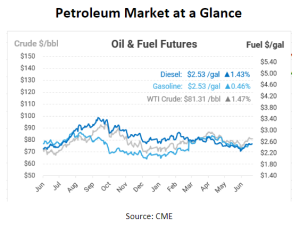
What’s That: Fuel Management System
Do you know where your fuel is going?
When you have a bulk fuel tank on your site, you’re sitting on inventory worth potentially tens of thousands of dollars. But often, businesses don’t have insight into how those gallons are being dispensed or dollars are being used. This lack of insight opens the door to a host of problems – environmental risk, theft, accounting challenges, and more.
In an era where efficiency and data transparency are paramount, fuel management systems (FMS) have emerged as critical tools for organizations reliant on fuel for their operations. These systems are designed to control and account for fuel consumption, ensuring proper use and enabling data management. For fuel buyers, understanding the intricacies of an FMS can lead to significant cost savings, improved operational efficiency, and easier environmental compliance.
What is a Fuel Management System?
A fuel management system is a component of your fueling infrastructure that includes hardware and software designed to monitor and control fuel usage. These systems are typically used by companies with fleets of vehicles and multiple drivers. The primary purpose of an FMS is to provide real-time authorization of fueling activity as well as data and insights into fuel consumption. Authorization of these systems can be achieved through multiple forms of media – card, fob, RFID, or unique PIN – and the data collected with each transaction enables organizations to derive insights and better manage their fuel usage.
Components of a Fuel Management System
A comprehensive fuel management system includes several key components, the first of which is fuel monitoring hardware. This includes a user interface mounted to the tank or placed on a pedestal. The interface is connected to the fuel dispenser and pulsars, so it can turn the pump on or off and measure throughput. Depending on the brand of equipment, the interface could include any/all of the following: a card reader, an RFID pad, a keypad for entering PINs, or a smart touchscreen. The interface could also include mobile app accessibility, allowing drivers to use their phones to turn on the pump.
Another component of the FMS, which can either be internal or external, is an internet connection. An FMS can be connected to the site’s local Wi-Fi or to an external cellular modem, or it may have an internal cellular connection.
The software component of an FMS collects data from the monitoring hardware, processes it, and presents it in a user-friendly interface. This platform often features analytics tools, reporting capabilities, the option to set fueling limits such as gallon limits or time-of-day restrictions, and alerts for exceptional fueling activity. It also will typically have functionality to add and remove vehicle or driver authorization.
How Do Fuel Management Systems Work?
Once installed, FMS’s are relatively simple to operate. There are a few different ways that drivers may interact with the unit to enable fueling. Some FMS units will only work with one of these methods, while more comprehensive systems may work with all – or a combination of – these options, such as cards and PINs combined:
Fob – A small fob is attached to the keychain of the vehicle’s keys, and enables fueling. When scanned, the FMS knows which fob has been scanned and therefore knows which vehicle (or driver, but not both) is receiving fuel.
PIN – Personal Identification Numbers can be assigned to both equipment and drivers, and a driver may be asked to enter one or both numbers on a keypad. Some systems support numbers-only IDs, while others support both numbers and letters.
Card – A proprietary card or a standard fleet card can be used with certain FMS units, allowing drivers to use the same card in the backyard that they would normally use at a gas station or truck stop.
Mobile App – Some systems work via Wi-Fi or Bluetooth to receive inputs from a smartphone app. Drivers would open the app in their phone, enter any required information such as vehicle ID, and the pump would unlock.
Proximity Card – For restricted-access areas where employees already have proximity cards to get in the gate, the same cards can be tied into an FMS unit to enable fueling.
RFID – Some newer systems install a device on the fuel pump and on each vehicle, so the driver does not need to enter any information. They simply put the fuel pump in the vehicle, and an RFID reader senses the vehicle’s tag and captures the needed data.
Why is an FMS so important?
Fuel buyers, particularly those managing large fleets, derive numerous benefits from implementing a fuel management system. By providing detailed insights into fuel consumption, an FMS helps identify inefficiencies and waste. This enables companies to take corrective actions, such as correcting driver errors or addressing fraudulent fuel transactions, leading to significant cost savings.
Real-time data and analytics allow for better planning and coordination of fuel-related activities. This results in reduced downtime, improved asset utilization, and enhanced overall efficiency. Tracking data may show that a large number of vehicles are filling up between 3-4pm and may be forming a line at the pump. That wasted time means engines running and drivers sitting idle. With this data, you can see where adding an additional dispenser could reduce wait times and improve driver satisfaction.
Bulk fuel tanks are subject to significant regulations, which are more stringent for underground tanks but are also present for aboveground tanks. If you’re only looking at tank inventories to monitor for leaks, you can’t accurately tell whether fuel leaving the tank is going through the pump or through a leak. Manual clipboard sheets are highly unreliable. An FMS ensures compliance by monitoring fuel usage, so you can accurately reconcile the inputs and outputs from the tank to ensure no leaks or theft occur.
Lastly, an FMS can enable multiple cost centers to dispense fuel from a single tank, with automated allocation of expenses. If every gallon of fuel dispensed is automatically associated with a specific vehicle, driver, and/or department, the back-end accounting for the fuel dispersed becomes far more scalable.
Conclusion
Fuel management systems represent a considerable advancement in the way organizations monitor and control fuel usage, offering a multitude of benefits, from cost savings and operational efficiency to improved security and compliance. As the demand for efficient and eco-friendly operations continues to grow, the adoption of fuel management systems is likely to become increasingly prevalent across various industries. Understanding and leveraging these systems can provide a competitive edge, ensuring that companies survive and thrive in a rapidly evolving market.
Designing, installing, and maintaining safe and compliant fuel systems requires expertise to get it right the first time. Mistakes can be costly. Mansfield Energy offers a complete suite of fueling system design, installation, and maintenance services. From bulk DEF storage and cardlock options to tank monitoring, fuel quality management, and 24/7 support, Mansfield can keep your fueling systems clean, environmentally compliant, and in good working order. Contact us today to get started.

This article is part of Daily Market News & Insights
Tagged:
MARKET CONDITION REPORT - DISCLAIMER
The information contained herein is derived from sources believed to be reliable; however, this information is not guaranteed as to its accuracy or completeness. Furthermore, no responsibility is assumed for use of this material and no express or implied warranties or guarantees are made. This material and any view or comment expressed herein are provided for informational purposes only and should not be construed in any way as an inducement or recommendation to buy or sell products, commodity futures or options contracts.





